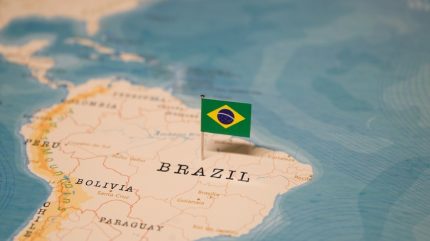
Novo Nordisk has invested 6.4bn Brazilian reais ($1.09bn) to expand its facility in Brazil as the company ramps up efforts to increase production of its flagship glucagon-like peptide 1 receptor agonist (GLP-1RA) products.
The investment, which is one of the largest in Brazil’s history according to Novo Nordisk, will see the pharma company’s Montes Claros facility upgraded with new aseptic production processes, a warehouse and a new quality control laboratory. Located in Southeastern Brazil, the Montes Claros site is already the largest insulin factory in Latin America. A variety of products will be made at the facility, including GLP-1RAs.

Discover B2B Marketing That Performs
Combine business intelligence and editorial excellence to reach engaged professionals across 36 leading media platforms.
The Danish drugmaker has already begun construction at the site, with operations slated to begin in 2028. The expansion of the facility will create 600 new jobs, adding to the 2,000 staff already employed by Novo Nordisk in the country including an administrative office in São Paulo.
“With this expansion of the Montes Claros site, we are strengthening our global production capacity, which will enable us to meet both current and future demand for innovative medicines worldwide,” said Novo Nordisk’s executive vice president of chemistry, production, control & product supply, Henrik Wulff.
The GLP-1RA market size in Brazil was estimated to be worth $581m in 2024, according to GlobalData’s Pharma Intelligence Centre. Novo Nordisk has not disclosed total sales of type 2 diabetes medication Ozempic (semaglutide) and weight loss drug Wegovy (semaglutide) in Brazil, though the country represents one of the company’s five biggest markets, as per comments made by Lars Fruergaard Jorgensen and reported by Reuters this week.
GlobalData is the parent company of Pharmaceutical Technology.

US Tariffs are shifting - will you react or anticipate?
Don’t let policy changes catch you off guard. Stay proactive with real-time data and expert analysis.
By GlobalDataNovo Nordisk’s manufacturing push comes at a time of impending pressure from future generics. Hypera, the largest pharmaceutical company in Brazil by market cap, has already announced plans to launch a generic version of Ozempic (semaglutide) when its patent expires in 2026.
Meeting GLP-1RA demand
Due to booming sales for its semaglutide products, Novo Nordisk has had a difficult year manufacturing enough to keep up with demand. Semaglutide was only recently removed from the US Food and Drug Administration (FDA) shortage list after the drugmaker assured the agency it could cope with demand going forward.
The Montes Claros site in Brazil is just one of many that Novo Nordisk has poured billions of dollars into as part of efforts to scale manufacturing capabilities. There was also the $16.5bn acquisition of CDMO Catalent in December 2024, a major boost to Novo Nordisk’s supply chain.
As per Reuters, the US will not be a destination for Novo Nordisk products manufactured in Brazil. Brazil is one the few countries that received the lowest reciprocal US tariff of 10% amongst the ongoing trade disputes initiated by US president Donald Trump, however these do not apply to pharmaceuticals. According to Reuters, the pharma sector should expect “major” tariffs to be introduced for pharma imports soon.
Pharma trade lobby EFPIA, of which Novo Nordisk is a member, has called on EU President Ursula von der Leyen for action amid a “risk of exodus” to the US.




